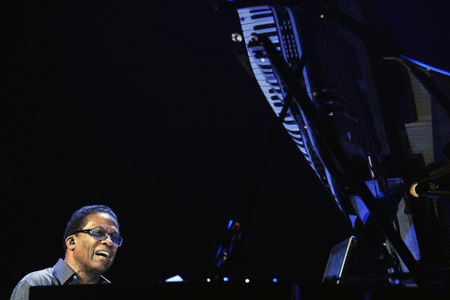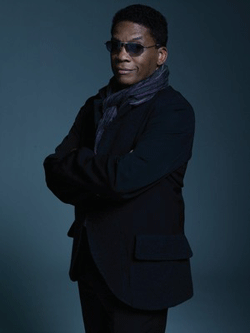Everyone’s making a big deal about Herbie Hancock’s 70th birthday.

Except Herbie Hancock.
The Grammy-winning keyboardist and composer, who turned the big seven-oh on April 12, will be the guest of honor in June at Carnegie Hall and in September at the Hollywood Bowl for concerts dubbed “Seven Decades: The Birthday Celebration.” Bill Cosby (in New York) and trumpet legend Wayne Shorter (in Hollywood) are among the scheduled guests.
But when asked what he wants those celebrations to celebrate, Hancock doesn’t even come close to preening like a peacock. No mention of his 12 Grammys, 50-plus albums, status as a pioneering and experimental jazz artist or years in the revered Miles Davis Quintet.
Hancock, chairman of the Thelonious Monk Institute of Jazz and creative chair for jazz with the Los Angeles Philharmonic, doesn’t laud his philanthropic endeavors, or his appearance at President Barack Obama’s inauguration (where he played Bob Marley’s “One Love” with will.i.am and Sheryl Crow), not even the endless roster of all-stars with whom he’s performed and recorded, from Stevie Wonder and Paul Simon to Sting and Josh Groban.
He told The Star in a phone interview that he wants his birthday to honor “the fact that I woke up in the morning. I celebrate life, period.”
So leave the belated birthday balloons and cupcakes at home on Sunday afternoon, when Hancock and his band will perform outdoors at Ventura College as part of the 16th Ventura Music Festival, which opens tonight and continues through May 8.
The collective weight of Grammys won by the three artists performing at the festival this weekend is crushing.
Along with Hancock’s dozen Grammys, add the two won by classical guitarist Sharon Isbin, who will play tonight, and the 15 collected by violinist Itzhak Perlman, performing Saturday (the Isbin and Perlman shows are sold out).
Hancock also owns an Oscar, which he won in 1986 for best original score for “’Round Midnight,” a film about a jazz tenor sax player. Perlman performed the haunting violin solos heard on John Williams’ Oscar-winning score for “Schindler’s List.”
Hancock and Perlman share an even higher honor: Both have been guests on “Sesame Street.”
The festival’s other headliners are the Calefax Reed Quintet (Tuesday), Escher String Quartet (May 7) and pianist Yeol Eum Son (May 8), all perhaps less known, but not lesser musicians. Also performing will be seven young musical soloists, from middle school through college age, for the festival’s “Rising Stars” concert with the Thousand Oaks Philharmonic Orchestra (Thursday).
Concerts will take place at “historic, architecturally unique” venues in Ventura, although Perlman’s sold-out concert will move south to the Oxnard Performing Arts and Convention Center to accommodate the clamoring classical-music crowds.
Hancock’s concert on a Ventura College athletic field — with its historic, architecturally unique grass — will begin at 2 p.m.
Global collaboration
Hancock, who lives in Beverly Hills with his wife, Gigi, can’t deny the power of the Grammys.
In 2008, Hancock’s “River: The Joni Letters,” featuring jazz interpretations of folk singer-songwriter Joni Mitchell’s songs, was a surprise winner for album of the year.
It was only the second time in history that a jazz album earned the top Grammy honor (the first was in 1964, when Stan Getz and João Gilberto won for “Getz/Gilberto”).
One week after the Grammy Awards, “River” jumped from No. 159 to No. 5 on the Billboard 200, with a 967 percent increase in number of albums sold.
“River” featured vocalists Norah Jones, Tina Turner, Corinne Bailey Rae, Luciana Souza, Leonard Cohen and Mitchell herself.
Hancock’s latest album, “The Imagine Project,” scheduled for a June 21 release, is rich with vocals, too.
The project, a collaboration among Hancock and superstar musicians from around the world, many recorded in the artists’ home territories, will also include a documentary DVD of the recording sessions.
His latest musical endeavor, Hancock said, “is sort of based off of John Lennon’s song ‘Imagine’ — about peace through mutual respect for cultures outside of our own.”
Tracks include “The Song Goes On” with sitarist Anoushka Shankar (Ravi Shankar’s daughter), Chaka Khan and Wayne Shorter, recorded in India; “Don’t Give Up” with Seal and Pink in London; “Imagine” with Congolese band Konono No. 1, guitarist Jeff Beck and songstress Oumou Sangaré of Mali, recorded in Paris and London; “Times They Are a Changin’” with The Chieftains and Lisa Hannigan in Ireland; “Mi Tierra” with Juanes in Miami; and a tune with singer-songwriter Ceu in Brazil.
Recording in other countries “helped the overall vibe,” Hancock said. “The first track we recorded was in India, and India is such a colorful country anyway. Tasting the food, seeing all the different colors, just having that flavor around, it kind of marinates in you.”
Hancock will tour this summer to promote “The Imagine Project,” but said his band might not “have time to rehearse that material and put it together” for the Ventura show.
On Sunday, Hancock will of course play keyboards, accompanied by a drummer, guitarist, bassist and singer.
Hancock didn’t have a set list ready for the Ventura concert, but said he’ll likely include material from “River,” his 2005 album “Possibilities” (which featured Sting, Annie Lennox, John Mayer, Christina Aguilera, Carlos Santana and others) and his instrumentals that have become jazz standards, such as “Chameleon” and “Maiden Voyage.”
Lyrical persuasion

Of Hancock’s 12 Grammy Awards, Nos. 1-10 were for instrumental tunes, starting with best R&B instrumental performance for “Rockit” in 1983, a song that also hit the Billboard charts.
The album for which Hancock won the highest honor, however, was a salute to a woman known for poetic words.
Hancock said on Tavis Smiley’s PBS talk show that “River: The Joni Letters” “gave me a chance to challenge one of the weaknesses that many of us jazz musicians have, which is we never pay attention to lyrics. But what a great opportunity I had. It doesn’t get better than Joni Mitchell.”
He told The Star, “Once I did ‘River,’ that really changed everything for me. It affects when I play. I try to respond to the lyrics, to the content of the lyrics.”
He pays attention to philosophy and spirituality, too.
Higher purpose
Hancock, a longtime Buddhist, said Buddhism “absolutely influences my music. Buddhism is very much about humanity and the essence of life and law — not the police, but universal law — and what’s really inside the human heart.
Over these 38 years of practicing Buddhism, I’ve had a lot of revelations about life or music or direction, and one of the most profound happened over the past eight years: me realizing that I am not a musician.
That’s what I do. That’s not what I am. What I am is a human being. It’s profound because now I approach music from the standpoint of being a human being, not a musician.”
This mind-set “brings up a whole new vision of starting a project,” he said. “Now I think about purpose first: Why do I want to do an album? What do I want to say on a record to people? What issues, if any, do I want to address? What can I do with my single voice?”
Imagine, for example, global peace through music.
In 2007 the Thelonious Monk Institute of Jazz presented the inaugural Herbie Hancock Humanitarian Award to Hancock himself, which honors someone “who has used their passion and influence for the greater good of society and mankind.” (Microsoft co-founder Paul Allen received the award in 2008.)
Hancock, in addition to being a strong supporter of jazz, champions other causes as well.
He’s co-president of the International Committee of Artists for Peace, honorary committee member of the Daniel Pearl World Music Days Foundation, and supports the Elizabeth Glaser Pediatric AIDS Foundation and Alzheimer’s Foundation of America, among other nonprofits.
Hancock, when receiving the humanitarian award, said, “Whether it’s being with some of the most powerful world leaders at diplomatic summits or teaching a classroom full of students in Vietnam, India or Peru, I’ve learned one thing is for certain.
When music arrives, people listen, not only to the music but to the message the music brings. And I assure you, I’m going to be bringing music and its unifying and harmonious message to many people as long as I have a single breath in my body.”
Breaths are wasted on blowing out birthday candles anyway.
Source : http://www.vcstar.com




